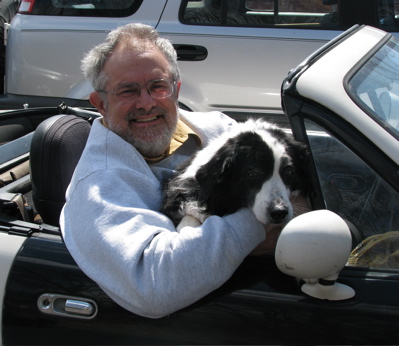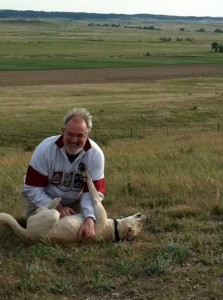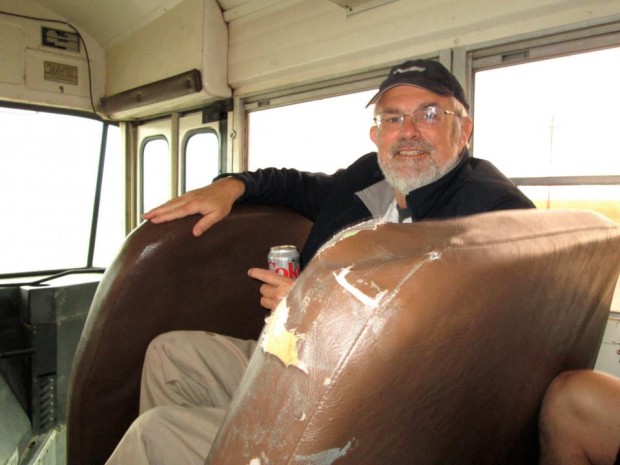
Guest contributor: Mike Land
Bad Advice Wednesday: Taking It Easy Is Harder Than It Looks
categories: Bad Advice / Cocktail Hour
2 comments
More than a year ago, while mired in the mentality of a busy semester at Assumption College in Worcester, Massachusetts, I hastily crafted a sabbatical proposal. My vision was limited by the campus work in which I was immersed – my project was inspired by a book I taught, Po Bronson’s What Should I Do With My Life?, as well as my administrative position, Director of Community Service Learning. Given my role on campus, I argued, it only made sense for me to spend a semester interviewing people about the role service played in their lives; I would do this as I drove from coast to coast, doing volunteer work of my own along the way. I’d write about it in both blog and book forms.
I got what I asked for. But was I asked for what I’d wind up wanting once the time for sabbatical came around?
 The latter question surfaced, again and again, as sabbatical began this winter. I realized that my proposal had ignored a subtle goal of most sabbaticals, an objective rooted less in product than process. Like most writers at teaching-intensive institutions, most of all, I simply wanted to immerse myself in the pleasure of writing. I wanted to ignore the need to network, center myself at the writing table – and learn, all over again, to love it. I would dive into what social scientist Mihaly Csikszentmihalyi calls the “flow state,” a way of being “in which people are so involved in an activity that nothing else seems to matter.” To guarantee I attained this state, and to placate my need for structure, I would track the hours that I sat still and shut out everything else, made myself fully available to the writing at hand.
The latter question surfaced, again and again, as sabbatical began this winter. I realized that my proposal had ignored a subtle goal of most sabbaticals, an objective rooted less in product than process. Like most writers at teaching-intensive institutions, most of all, I simply wanted to immerse myself in the pleasure of writing. I wanted to ignore the need to network, center myself at the writing table – and learn, all over again, to love it. I would dive into what social scientist Mihaly Csikszentmihalyi calls the “flow state,” a way of being “in which people are so involved in an activity that nothing else seems to matter.” To guarantee I attained this state, and to placate my need for structure, I would track the hours that I sat still and shut out everything else, made myself fully available to the writing at hand.
This, as the phrase often goes in post-sabbatical reports, is what happened instead.
The first week or so went well enough: I wrote and set out some short pieces, setting the stage for planning the official project. First problem: The trip required money – and the deadline for our school’s faculty development grant applications was coming up fast. And said grant entailed a detailed proposal, one made all the more challenging because the more I tried to justify the school giving me money for the project, the greater the ambition of the project grew. Each answer only led to new questions, seemingly scores of them. I spent hours talking out the book concept with colleagues, hashing out angles and details, themes and logistics, convictions and marketability. My gut checks were both emotional and physical – I had to get rid of my gut if my back was going to survive 8,000 or so miles of driving, volunteering, and sleeping in bunks. As I tried to treadmill away the pounds, my brain would be swirling with all variables.
 A lot has to happen. The journalistic nature of the trip means I have to find the right people in the right places, as well as lodgings and volunteer opportunities. The rationale is rock-solid: In nonfiction, there’s no writing around lack of material. Get the right people and situations, and passages seem to write themselves; don’t get those things, and the book might not be worth writing at all. Still, I can’t help but feel that the deeper goal of sabbatical has fallen prey to irony – in my anxiety to earn sabbatical, I’ve created a project that only succeeded in replacing the mental clutter of teaching and administration with the dizzying logistics of a travel planner. I wake up every morning anxious not to craft a sentence, but fire off an email.
A lot has to happen. The journalistic nature of the trip means I have to find the right people in the right places, as well as lodgings and volunteer opportunities. The rationale is rock-solid: In nonfiction, there’s no writing around lack of material. Get the right people and situations, and passages seem to write themselves; don’t get those things, and the book might not be worth writing at all. Still, I can’t help but feel that the deeper goal of sabbatical has fallen prey to irony – in my anxiety to earn sabbatical, I’ve created a project that only succeeded in replacing the mental clutter of teaching and administration with the dizzying logistics of a travel planner. I wake up every morning anxious not to craft a sentence, but fire off an email.
I can’t help feeling that in the way I asked for both sabbatical and funding, I have somehow let the tail wag the dog. Whatever happened to that almost spiritual notion of diving deep into the river of the creative flow state?
But as Dr. Flow State reminds us in his summarizing of exhaustive studies, there are myriad ways to enter into flow, and even do so creatively. The truth is that I still wake up close to a flow state – I plot when I construct the sequence of towns, invoke setting as I evaluate the ideal service work for each geographical context, and flesh out characters by imagining whom I need to meet. Every email I send in search of said characters is a chance to refine the vision, clarifying what’s in it for them, for their agency, and for the story I’m trying to tell. Every choice I make is rooted in a creative option for the book to come, my consideration of all the possible angles I want to explore.
I may not be writing the book, but I am writing the trip. I have faith that the trip, and my life, will be the richer for the writing.
And that’s my bad advice: When all else fails, write your trip!
 When Mike Land was 18, a computer spat out the results of a standardized career test that claimed he’d be either a writer, a teacher, or a pastor. He swore contemptuously that no standardized test could “measure the depths of the human soul” and stuck the dot-matrix printout t in a notebook that wound up in his mother’s attic. By the time he saw those results again, he had worked as a church youth director and a newspaper journalist, earned two creative writing degrees, and wound up both writing and teaching writing while running a community service learning program at a religiously affiliated college (Assumption College in Worcester, Mass.). All of which leaves him wondering if, despite his Unitarianism, maybe his soul isn’t really all that complex a read. He is currently circulating a manuscript about a dog-themed road trip.
When Mike Land was 18, a computer spat out the results of a standardized career test that claimed he’d be either a writer, a teacher, or a pastor. He swore contemptuously that no standardized test could “measure the depths of the human soul” and stuck the dot-matrix printout t in a notebook that wound up in his mother’s attic. By the time he saw those results again, he had worked as a church youth director and a newspaper journalist, earned two creative writing degrees, and wound up both writing and teaching writing while running a community service learning program at a religiously affiliated college (Assumption College in Worcester, Mass.). All of which leaves him wondering if, despite his Unitarianism, maybe his soul isn’t really all that complex a read. He is currently circulating a manuscript about a dog-themed road trip.


Excellent advice in any endeavor. Thanks!
Always a pleasure to see and/or hear you. I look forward to reading your ramblings…
-Guest room is always open.
-Guy